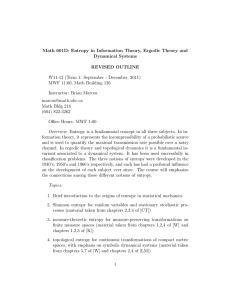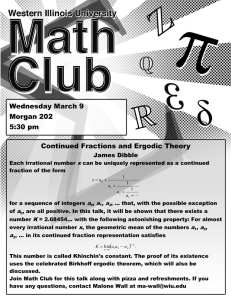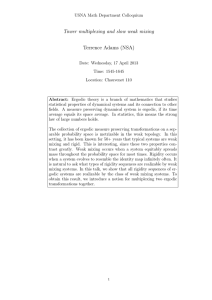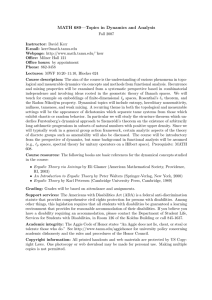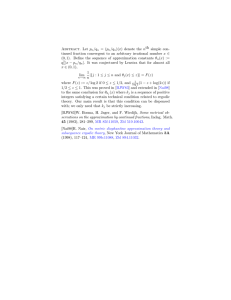Math 601D (Section 201): Entropy and Equilibrium States in
advertisement
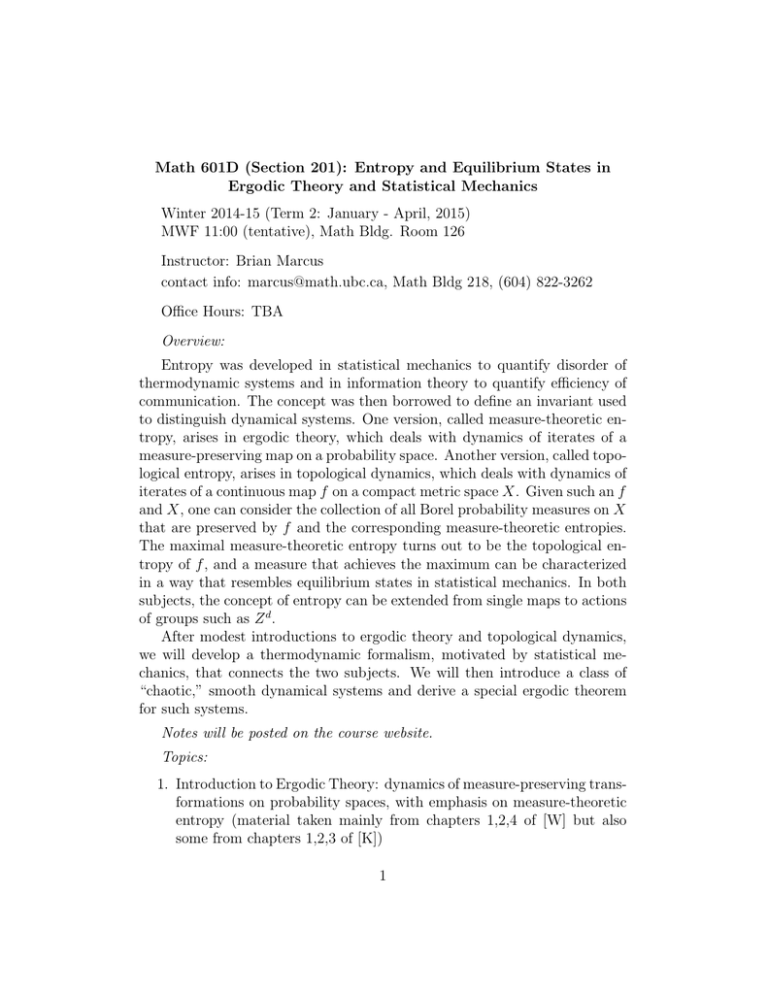
Math 601D (Section 201): Entropy and Equilibrium States in Ergodic Theory and Statistical Mechanics Winter 2014-15 (Term 2: January - April, 2015) MWF 11:00 (tentative), Math Bldg. Room 126 Instructor: Brian Marcus contact info: marcus@math.ubc.ca, Math Bldg 218, (604) 822-3262 Office Hours: TBA Overview: Entropy was developed in statistical mechanics to quantify disorder of thermodynamic systems and in information theory to quantify efficiency of communication. The concept was then borrowed to define an invariant used to distinguish dynamical systems. One version, called measure-theoretic entropy, arises in ergodic theory, which deals with dynamics of iterates of a measure-preserving map on a probability space. Another version, called topological entropy, arises in topological dynamics, which deals with dynamics of iterates of a continuous map f on a compact metric space X. Given such an f and X, one can consider the collection of all Borel probability measures on X that are preserved by f and the corresponding measure-theoretic entropies. The maximal measure-theoretic entropy turns out to be the topological entropy of f , and a measure that achieves the maximum can be characterized in a way that resembles equilibrium states in statistical mechanics. In both subjects, the concept of entropy can be extended from single maps to actions of groups such as Z d . After modest introductions to ergodic theory and topological dynamics, we will develop a thermodynamic formalism, motivated by statistical mechanics, that connects the two subjects. We will then introduce a class of “chaotic,” smooth dynamical systems and derive a special ergodic theorem for such systems. Notes will be posted on the course website. Topics: 1. Introduction to Ergodic Theory: dynamics of measure-preserving transformations on probability spaces, with emphasis on measure-theoretic entropy (material taken mainly from chapters 1,2,4 of [W] but also some from chapters 1,2,3 of [K]) 1 2. Introduction to Topological Dynamics: dynamics of continuous maps on compact metric spaces, with emphasis on topological entropy and symbolic dynamical systems (material taken from chapters 5,7 of [W]) 3. Introduction to Thermodynamic Formalism (connections between topics 1 and 2): pressure, variational principle, equilibrium states, Gibbs states, phase transitions (material taken from chapters 6,8,9 of [W], chapters 1,2 of [B], chapters 4,5 of [K] and chapters 1-5 of [R]) 4. Introduction to the ergodic theory of smooth dynamical systems: hyperbolic systems, Markov partitions and symbolic representation, an ergodic theorem for hyperbolic attractors (material taken from chapters 3-4 of [B], chapter 7 of [R] and chapter 6 of [K]). This will require a tiny bit of differential geometry, which will be covered in class. Pre-requisites: Analysis, including measure theory and a bit of functional analysis, and probability theory, preferably at the graduate level. Please consult the instructor if you have any questions. Target audience: Students in ergodic theory, probability theory, statistical mechanics, and information and communication theory. Course requirement: There will be two homework assignments, mainly to encourage students to keep up: one after the ergodic theory section and another after the topological dynamics section. Students will be encouraged to work together on the homework. Each student will also give a talk on a topic of his/her choice related to the course. Main References: There is no required textbook. Notes will be posted on the course website based on material taken from the sources below. Personally, I find [W] and [B] easiest to read, but they do not treat actions of Z d . [B] R. Bowen, Equilibrium states and the ergodic theory of Anosov diffeomorphisms, Springer Lecture Notes in Mathematics, 470, 1975, reprinted in 2008 (a classic text that applies ideas from statistical mechanics to ergodic theory of smooth systems). The 1975 version can be accessed online through the UBC library. 2 [K] G. Keller, Equilibrium States in Ergodic Theory, London Mathematical Society Student Notes, vol. 42, Cambridge U. Press, 1998 (a more advanced introduction to ergodic theory with emphasis on greater generality and connections to ideas from statistical mechanics) [R] D. Ruelle, Thermodynamic Formalism, Cambridge Mathematical Library, 1978, 2nd edition 2004 (a classic text that develops fundamental ideas of mathematical statistical mechanics) [W] P. Walters, An Introduction to Ergodic Theory, Graduate Texts in Mathematics, v, 79, Springer-Verlag, 1982 (a basic introduction to the fundamentals of ergodic theory and topological dynamics) 3
